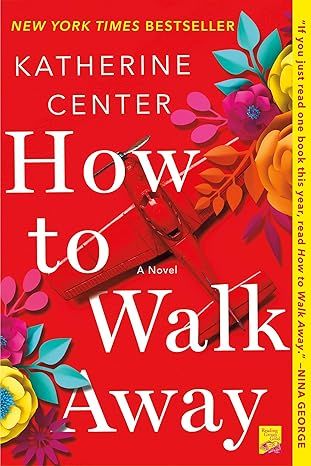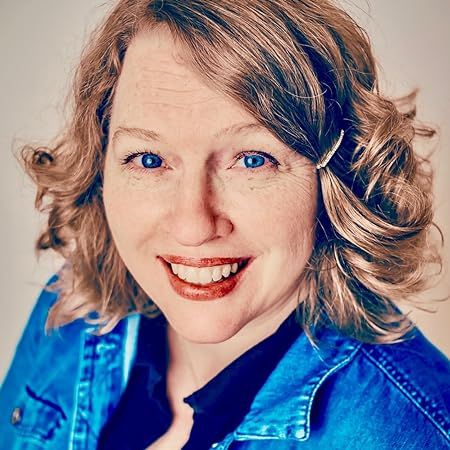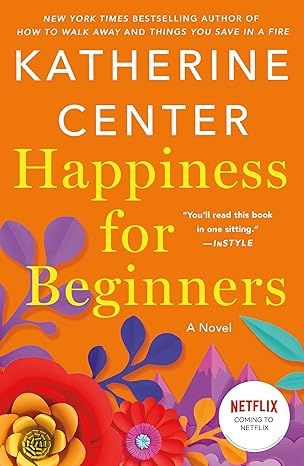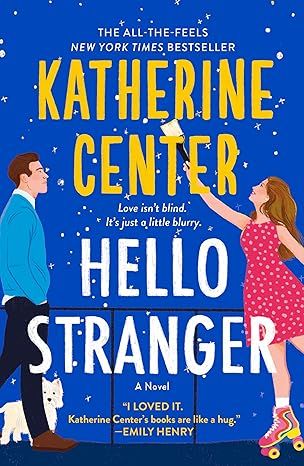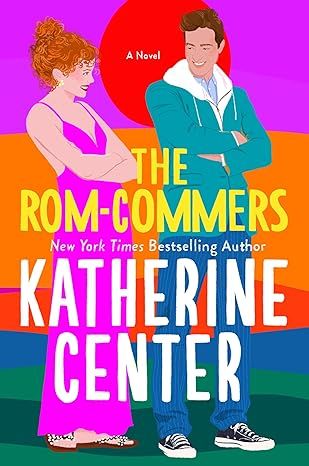How to Walk Away: A Novel
4.4
-
10,399 ratings
From the author of Happiness for Beginners comes the instant New York Times bestseller (May 2018), an unforgettable love story about finding joy even in the darkest of circumstances.
Margaret Jacobsen is just about to step into the bright future she’s worked for so hard and so long: a new dream job, a fiancé she adores, and the promise of a picture-perfect life just around the corner. Then, suddenly, on what should have been one of the happiest days of her life, everything she worked for is taken away in a brief, tumultuous moment.
In the hospital and forced to face the possibility that nothing will ever be the same again, Maggie must confront the unthinkable. First there is her fiancé, Chip, who wallows in self-pity while simultaneously expecting to be forgiven. Then, there's her sister Kit, who shows up after pulling a three-year vanishing act. Finally, there's Ian, her physical therapist, the one the nurses said was too tough for her. Ian, who won't let her give in to her pity, and who sees her like no one has seen her before. Sometimes the last thing you want is the one thing you need. Sometimes we all need someone to catch us when we fall. And sometimes love can find us in the least likely place we would ever expect.
How to Walk Away is Katherine Center at her very best—a masterpiece of a novel that is both hopeful and hilarious; truthful and wise; tender and brave.
Praise for How to Walk Away:
"A heartbreak of a novel that celebrates resilience and strength." —Jill Santopolo, bestselling author of The Light We Lost
"If you just read one book this year, read How to Walk Away." —Nina George, New York Times bestselling author of The Little Paris Bookshop
"Warm, witty, and wonderfully observed." —Emily Giffin, New York Times bestselling author of First Comes Love
"Sympathetic and refreshing!" —Elinor Lipman, bestselling author of The Family Man
"I can't think of a blurb good enough for this novel...poignant, funny, heartbreaking." —Jenny Lawson, bestselling author of Furiously Happy
Read more
Kindle
$11.99
Available instantly
Audiobook
$0.00
with membership trial
Hardcover
$26.95
Paperback
$9.99
Ships from
Amazon.com
Payment
Secure transaction
ISBN-10
1250047315
ISBN-13
978-1250047311
Print length
368 pages
Language
English
Publisher
St. Martin's Griffin
Publication date
July 08, 2019
Dimensions
5.35 x 0.95 x 8.25 inches
Item weight
1 pounds
Popular highlights in this book
It’s the trying that heals you. That’s all you have to do. Just try.
Highlighted by 2,039 Kindle readers
The greater our capacity for sorrow becomes, the greater our capacity for joy.
Highlighted by 1,694 Kindle readers
When you don’t know what to do for yourself, do something for somebody else.
Highlighted by 986 Kindle readers
Product details
ASIN :
B076B271QT
File size :
3879 KB
Text-to-speech :
Enabled
Screen reader :
Supported
Enhanced typesetting :
Enabled
X-Ray :
Enabled
Word wise :
Enabled
Editorial reviews
Praise for How to Walk Away
An instant New York Times bestseller (May 2018)!
"This generous story about family secrets, love in sickness and in health, and the resilience of the human spirit has serious Nora Ephron vibes." --Taylor Jenkins Reid, bestselling author of Daisy Jones & The Six
"A marvelous example of acceptance and healing and a celebration of family." --USA Today
"Center explores the limits of hope and love...[she] transforms the story of a family tragedy into a heartfelt guide to living the fullest life possible." --Publisher's Weekly
"With its appealing characters and wisdom about grappling with life's challenges, Center's sixth novel has all the makings of a breakout hit." --Booklist (starred review)
"Inspiring and romantic... A touching and truthful novel that shows how people can find comfort in the most unexpected places." --Library Journal
"A story about survival that is heartbreakingly honest and wryly funny, perfect for fans of Jojo Moyes and Elizabeth Berg." --Kirkus
"A heartbreak of a novel that celebrates resilience and strength." --Jill Santopolo, bestselling author of The Light We Lost
"If you just read one book this year, read How to Walk Away." --Nina George, New York Times bestselling author of The Little Paris Bookshop
"Warm, witty, and wonderfully observed." --Emily Giffin, New York Times bestselling author of First Comes Love
"Sympathetic and refreshing!" --Elinor Lipman, bestselling author of The Family Man
"I can't think of a blurb good enough for this novel...poignant, funny, heartbreaking." --Jenny Lawson, bestselling author of Furiously Happy
Read more
Sample
One
THE BIGGEST IRONY about that night is that I was always scared to fly.
Always. Ever since I was old enough to think about it.
It seemed counterintuitive. Even a little arrogant. Why go up when gravity clearly wanted us to stay down?
Back in high school, my parents took my big sister, Kitty, and me to Hawaii one year. I dreaded the flight from the moment they told us until well after we were home again. The phrase “flying to Hawaii” translated in my head to “drowning in the ocean.” The week before the trip, I found myself planning out survival strategies. One night after lights out, I snuck to Kitty’s room and climbed into her bed.
I was a freshman, and she was a senior, which gave her a lot of authority.
“What’s the plan?” I demanded.
Her face was half buried in the pillow. “The plan for what?”
“For when the plane hits.”
She opened an eye. “Hits what?”
“The ocean. On the way to Hawaii.”
She held my gaze for a second. “That’s not going to happen.”
“I have a bad feeling,” I said.
“Now you’re jinxing us.”
“This is serious. We need a survival strategy.”
She reached out and patted my bangs. “There is no survival strategy.”
“There has to be.”
“No.” She shook her head. “Because if we don’t crash, we won’t need one. And if we do crash…” She paused so I could catch her drift.
“We won’t need one?”
A nod. “We’ll just be dead.” Then she snapped her fingers.
“You make it sound easy.”
“Dying is easy. It’s not dying that’s hard.”
“Guess you have a point there.”
She closed her eyes. “That’s why I’m the brains of the family.”
“I thought I was the brains,” I said, nudging her.
She rolled away. “You know you’re the beauty.”
Impossibly, we survived that trip.
Just as impossibly, I survived many more trips after that, never hitting anything worse than turbulence. I’d read the statistics about how flying was the safest of all the modes of transportation—from cars to trains to gondolas. I’d even once interned at an office right next to an international airport and watched planes go up and come down all day long with nary a problem. I should have been long over it.
But I never could lose the feeling that “flying” and “crashing” were kind of the same thing.
Now, years later, I was dating—seriously dating—a guy who was just days away from getting his pilot’s license. Dating him so seriously, in fact, that on this particular Saturday, as we headed out to celebrate my not-yet-but-almost-official new dream job, I could not shake the feeling that he was also just about to ask me to marry him. Like, any second.
Which is why I was wearing a strapless black sundress.
If I’d thought about it, I might have paused to wonder how my boyfriend, the impossibly fit and charming Charles Philip Dunbar, could be one hundred percent perfect for me in every possible way—and also be such an air travel enthusiast. He never thought twice about flying at all—or doing anything scary, for that matter, like scuba diving or bungee jumping. He had an inherent faith in the order of the universe and the principles of physics and the right of mankind to bend those principles to its will.
Me, I’d always suspected that chaos was stronger than order. When it was Man against Nature, my money was on Nature every time.
“You just never paid attention in science class,” Chip always said, like I was simply under-informed.
True enough. But that didn’t make me wrong.
Chip believed that his learning to fly was going to cure my fears. He believed that he’d become so awesome and inspiring that I’d have no choice but to relax and enjoy it.
On this, we had agreed to disagree.
“I will never, ever fly with you,” I’d announced before his first lesson.
“You think that now, but one day you’ll beg me to take you up.”
I shook my head, like, Nope. “Not really a beggar.”
“Not yet.”
Now, he was almost certified. He’d done both his solo and his solo cross-country. He’d completed more than twice his required hours of flight training, just to be thorough. All that remained? His Check Ride, where a seasoned pilot would go up with him and put him in “stressful situations.”
“Don’t tell me what they are,” I’d said.
But he told me anyway.
“Like, they deliberately stall the plane, and you have to cope,” he went on, very pleased at the notion of his impressive self-coping. “Or you do a short-field landing, where you don’t have enough space. And of course: night flying.”
The Check Ride was next week. He’d be fine. Chip was the kind of guy who got calmer when things were going haywire. He’d make a perfect pilot. And I’d be perfectly happy for him to fly all he wanted. By himself.
But first, we were getting engaged—or so I hoped. Possibly tonight. On Valentine’s.
I can’t tell you how I knew, exactly. I’d just sensed it all day, somehow, the way you can sense it’s going to rain. By the time I buckled in beside him in his Jeep, I was certain.
I’d known Chip a long time. We’d been dating for three years. I knew every expression in his repertoire and every angle of his body. I knew when he was faking a laugh, or when he was bullshitting. I could tell in seconds if he liked a person or not. And I certainly knew when he was hiding something—especially something he was excited about. Even though this date seemed exactly like every other date we’d ever had, I just knew something big was about to happen.
I figured he’d take us to the Italian place with the twinkle lights where we’d had our first date. But, instead of heading for downtown, he turned toward the freeway and ramped up.
The top was off his Jeep. I clamped my arms down over my hair. “Where are we going?” I called.
He called back, “It’s a surprise!”
My stomach dropped at that. Once again, I knew Chip’s intentions without his even hinting. This was kind of a problem with us. I could read him too well. He wasn’t taking me to dinner. He was taking me to the airport.
TWENTY MINUTES LATER, we had left the city of Austin far behind. He pulled up the parking brake beside an airplane hangar at a private airfield in the middle of nowhere.
I looked around. “You can’t be serious.”
He leaned in. “Are you surprised?”
“Yes and no.”
“Just pretend. Just once, I’d like to surprise you.”
“Fine. I’m shocked. I’m awed.”
“Don’t pretend that much.”
He came around to my side and took me by the hand, and then he pulled me behind him, bent over all sneaky, around to the far side of the hangar.
I followed him in a state of cognitive dissonance—knowing exactly what he was doing while insisting just as clearly that he couldn’t possibly be doing it. “Are you sneaking me in here?” I whispered.
“It’s fine. My friend Dylan did it with his girlfriend last week.”
I tugged back against his hand. “Chip. I can’t!”
“Sure you can.”
“Is this—illegal?”
“I just want to show you my plane.”
“It’s not your plane, buddy.”
“Close enough.”
I had zero interest in seeing his plane. Less than zero. I was interested in wine and appetizers and candlelight. I almost had the job of my dreams! I wanted to be celebrating. I was in the mood to feel good, not bad. “Can’t we just go to dinner?”
He peered around, then turned back to me. “Anybody can go to dinner.”
“I’m cool with being anybody.”
“I’m not.”
Then, with a coast-is-clear shrug, he pulled me out across the pavement and stopped in front of a little white Cessna. It looked like the kind of plane you’d see in a cartoon—wings up high, body below, and a spinny little propeller nose. Very patriotic, too. Red, white, and blue stripes.
“Cute,” I said with a nod, like, Great. We’re done.
But he took my shoulders and pointed me toward the cockpit.
I took a step back. “What are you doing?”
“Let’s go for a ride.”
“I’m afraid to fly. Remember?”
“Time to get over that.”
“I’ll throw up. I’ll be motion-sick.”
“Not with me, you won’t be.”
“It’s not about you. It’s about flying.”
“You just need the right pilot.”
I was shaking my head—half disbelief, half refusal. “You’re not even certified.”
“I’m as good as certified. I’ve done everything there is.”
“Except take the test.”
“But the test is just to see what you’ve already learned.”
“Chip? No.”
“Margaret? Yes. And right now before they catch us.”
The force of his insistence was almost physical, like a strong wind you have to brace against. He wanted to do this. He wanted me to do this—to show faith in him, to believe in him. It wasn’t a test, exactly, but it was still something I could fail.
I wasn’t a person who failed things.
I was a person who aced things.
It felt like a big moment. It felt draped in metaphorical significance about bravery, and trust, and adventurousness—like it would reveal something essential about who I was and how I’d live the rest of my whole life. Saying no to flying right now suddenly felt like saying no to every possibility forever. Did I want to be a person who let minuscule statistical risks undermine any sense of bravery? Was this a challenge I couldn’t rise to? Was I going to let fear make me small?
I’m not sure I ever really had a choice. Chip was Chip. He was my perfect man, and I’d thought so ever since his parents moved in next door to my parents, back when we were both in college. Our mothers became best next-door-neighbor friends, drinking wine on the patio and gossiping, but I only saw him on vacations. In the summers, his dad made him mow the lawn, and I��’d stand at our window and watch. One time, my mom urged me to take him out a bottle of water, and he glugged the whole thing down in one swoop. I still remember it in slow-mo.
But I really didn’t know him at all until we both wound up at business school together back home in Austin by accident. I was team leader of our study group, and he worked under me, which was good for him.
That’s how we fell in love.
I’d have married him that first night we kissed, if he’d asked me. He was that kind of guy. Tall, clean-shaven, blond, all-American, high-achieving, confident. And dreamy. People did what he wanted. I felt lucky to be with him, and I’d doodled “Margaret Dunbar” more times than I’ll ever admit. I once Googled dog breeds for our future pet. And one night, when shopping for something else—I swear—on the Home Depot website, I clicked on a little pop-up box for wood fence pickets. Just to see how much they were.
Now we were both out of school with our brand-new MBAs, both about to start our new jobs—Chip as an entry-level financial analyst at an investment bank, a job he found through a friend of his dad, and me as a business development manager for an oil and gas company called Simtex Petroleum. His job was good, but mine was far better, and I thought it was sporting of him, and rather gallant, to be so happy for me.
In truth, I wasn’t even qualified for my new job. It required “five years of experience in the sector,” “advanced knowledge of bidding for commercial contracts,” and actual “international experience,” none of which I had—but my B-school mentor had gone out on a limb for me, calling in a favor from a friend and writing a stunning letter of recommendation that called me a “fiercely energetic forward thinker, a problem solver, an excellent communicator, and a team player with strong business and financial acumen.”
I’d laughed when he’d showed me the job listing. “I’m not remotely qualified for this.”
��“People get jobs they’re not qualified for all the time.”
I stared at the description. “They want ‘demonstrated strategic and higher operational level engagement with the logistics environment.’”
“You’re a shoo-in.”
“I’m a joke.”
“Now you’re just thinking like a girl.”
“I am a girl.”
“We need to remedy that.”
I gave him a look.
“When you go to this interview, I want you to pretend to be a man.”
I closed my eyes. “Pretend to be a man.”
“A badass man,” he confirmed. “A man who’s not just qualified, but overqualified.”
I shook my head at him.
“Qualifications,” he said, “pale in the face of confidence.”
“If you say so,” I said. Though I didn’t believe it for a second. I went into the interview that day fully expecting to be laughed out of the room. But I did what he told me to. I pretended like hell—if nothing else, to prove him wrong.
Then they offered me the job. Or, at least, as the HR guy walked me to the lobby, he touched my shoulder and said, “It’s not official, but you’ve got it.”
My starting salary was going to be 50K higher than Chip’s—but my mother told me not to tell him that. The important thing was: We were beginning our lives. Things were falling into place.
And here, at the airfield, I didn’t want to be the only thing that didn’t.
Chip squeezed my hands. “You trust me, right?”
“Yes.” Sort of.
Then he pulled me into a kiss—a manly, determined, all-this-can-be-yours kiss, digging his tongue into my mouth in a way that he clearly found powerful and erotic, but that I, given how the sheer terror of what I was about to do had iced my blood, was too numb to feel.
Then he swatted me on the butt and said, “Climb in.”
What can I say? I did it.
But I’m telling you, my hands were shaking.
As I worked on hooking the shoulder strap, I gave myself a stern talking-to: This was the right thing to do. Wasn’t that what love was, after all? Saying yes—not just when it was easy, but also when it was hard?
Of course, any analyst worth her degree could have easily made the exact opposite argument: that I should trust my gut, and I shouldn’t let Chip push me into doing things I didn’t want to do. That his lack of respect for my genuine discomfort in the face of his Top Gun fantasies did not bode well for our long-term prospects.
But I wasn’t going there.
I was going flying.
Then he was next to me, buckling up and handing me a set of black headphones. I had that feeling you get once you’ve picked a roller coaster seat and clamped yourself in.
Chip immediately shifted into character as the pilot. He slid his aviator sunglasses on and pressed the headphone mic so close to his mouth that his lips brushed against it, and started speaking a language to the control tower so specialized, it was basically nonsense: “South Austin Clearance Delivery—Cessna Three Two Six Tango Delta Charlie with information Juliet—VFR to Horseshoe Bay cruising three thousand three hundred.”
It sounded to me like he was pretending. Who talked like that? But the tower didn’t agree. Crackling through the headphones came “Cessna Three Two Six Tango Delta Charlie—South Austin Clearance—squawk two three one four, departure frequency will be one two zero point niner.”
Oh, shit. This was happening.
Chip checked instruments and dials, looking them over like a pro. He looked at ease. Capable. Trustworthy. Macho, too. And, dammit, yes: super cool.
“I already went through my safety checklist before I came to get you—twice,” he said. His voice was crackly through the headphones, but he took my hand and squeezed. “Didn’t want to give you time to change your mind.”
Smart.
But I was all in by this point. I’d made my choice. For better or worse, as they say.
So Chip turned his attention to bigger things.
Still in sexy-pilot mode, he spoke into the mic and gave another nonsense message to the tower, confirming that we were waiting for the runway. I’d never been in the cockpit of a plane before, and this plane was all cockpit. Technically, there were two seats behind us, but it felt like we were in a Matchbox car.
Another plane had to land before we could take off, and I studied the dashboard with all its knobs and dials and ’ometers. I pointed at it. “Isn’t this kind of tall?” It was higher than my head. I could barely see over.
He nodded. “It’s not like driving a car,” he explained, “where it’s all about what you see. Flying’s more instrument based.”
“You don’t look out the windshield?”
“You do, but you’re looking at the instruments and gauges just as much. It’s half looking, half math.”
The other plane touched down, slowed, and trundled past us. See? I said to myself. They survived. We revved up, Chip announced us again over the radio, and he started working the pedals to bring us into position. The blades on the propeller spun so fast they disappeared. The plane vibrated and hummed. I sat on my cold hands so I wouldn’t squeeze them into fists.
“Please don’t do any loop-de-loops or anything,” I said then.
He glanced over. “Loop-de-loops?”
“Spins or flips. Or whatever. Show-offy stuff.”
“I don’t have to show off for you,” he said.
“You sure don’t.”
“You already know how awesome I am.”
I gave a nod. “Yes. And also, I might throw up.”
We sped up, casting ourselves forward. As we lifted off, I decided it wasn’t that different from going up in a regular plane. A little bumpier, maybe. A smidge more front-and-center. A tad more Out of Africa.
The ground floated away beneath us. Easy.
Chip was focused and calm, and it was so strange to think he was making it all happen. Once we were airborne, he started narrating everything he was doing, as if he were giving me a lesson. He told me the Cessna 172 was the most popular plane ever built. A classic. We would level off at 3,000 feet. We’d be traveling 125 miles an hour, speeding up as the air thinned out so we didn’t stall. He had to scan the sky for other planes, as well as watch the radar on the screen for towers.
Then something disturbing: He mentioned that the fuel was in the wings.
“That seems like bad engineering,” I said. “What if the wings break off? You’ll get doused in fuel.”
“The wings don’t break off,” Chip said. “That’s not a thing.”
“But if they did.”
“If they did, you’ve got bigger problems than a fuel spill.”
I put my hands in my lap and deliberately arranged them so they would not look clenched.
The plane was loud—hence the headphones—and we vibrated more in the air than we had on the ground, especially when we passed under a cloud. Chip explained that clouds actually sit on columns of rising air, and that turbulence happens when you cut through those columns. I had never thought of clouds as sitting on anything—just floating—but once he said it, it made sense. The more sense he made, the safer I felt.
He grinned over at me. “Awesome, huh?”
Kind of. “Awesome.”
“Still scared?”
Yes. “Nope.”
“Glad you came?”
“I’ll be gladder once we’re back on the ground.”
“I knew you’d enjoy it. I knew you could be brave if you tried.”
Such an odd compliment. As if he’d never seen me be brave before. As if my capacity for bravery had been up for debate.
But I did feel braver now, as we rose above the subdivisions laid out like a mosaic below us.
The hardest part was over, I remember thinking.
Before long, the suburbs beneath us thinned out, and I realized I had no idea where he was taking me.
“Where are we going?” I asked.
“I’m just going to show you one quick thing,” Chip said, “and then we’ll turn back around and go home.”
I could see that up ahead, dark and jagged, was a body of water.
“Is that Horseshoe Bay?” I asked. My grandparents had a house there. I’d been there a million times, but I’d never seen it from this angle.
Chip nodded. “You guessed it.”
We were approaching the far shore. “What do you want to show me?”
“Wait and see.”
Chip angled us back to circle over the lake, brought our altitude down a bit, and maneuvered us closer to the water. I could see houses and little cars below, but it was hard to recognize anything from this bird’s-eye view. We dipped a little lower, close enough to see little waves breaking against the shore.
“Keep an eye on the beach,” he said, taking us lower still.
I peered out my window. A thin strip of sand, and people, and picnic tables on the grass nearby. Now I recognized it. The public beach on the far shore.
After a few minutes, he said, “There!” and pointed.
I looked. “Where?”
“Can you read it?” Chip asked.
“Read what?”
He peered down, out his side window. “Shit. We’re too high.”
But any lower made the towers on the radar turn red.
Chip turned my way. “There’s writing in the sand down there.”
I didn’t see anything. “What does it say?”
“It says, ‘Marry me!’”
My heart gave a little jolt, but I played it cool. “It does?” I couldn’t see any writing in the sand.
“I saw it on the news yesterday. A guy proposed by writing the words in giant letters in the sand with rocks, then taking his girlfriend for a picnic by the lake to surprise her.”
“Cool,” I said, like it was just empirically interesting. What were we talking about?
“I really wanted you to see those words.”
“You did?”
“I did.” He glanced over again. “Because I’ve been wanting to ask you the same question.”
It’s one thing to expect something to happen, or root for it, or hope—and it’s another thing entirely to live the actual moment. I put my hand to my mouth and pressed my head to the window one more time for a better look.
“And there’s something else. Open the glove box.”
Sure enough, there was a little storage compartment in front of me. Inside, I found an emerald-green velvet ring box.
I was so glad I’d forced myself into this plane. Sometimes, terrifying, nausea-inducing risks are worth it. I turned to Chip. “You’re asking me to marry you?”
His voice crackled out through the headphones. But I knew the answer was yes.
So I gave my own answer. “Yes!”
“You haven’t even opened the box.”
“I don’t need to. Just: Yes!”
Chip turned toward me with a big smile full of perfect teeth. I could see myself reflected in his sunglasses, and my hair was a mess. I fought the urge to straighten it up. I also fought the urge to climb over and kiss him. It seemed strange not to kiss at a moment like that, but no way was I unbuckling. I couldn’t even remember how to unhook the shoulder strap.
Instead, I gave him a thumbs-up.
“It’s not official till you put on the ring,” he said.
I opened the box to find a very ornate gold-and-diamond engagement ring.
“It was my grandmother’s,” he said.
I pulled it out and slid it onto my finger. It was a bit big. Big enough, actually, that when I held out my hand to admire it, the diamond slid to the side and hung upside down.
“It’s perfect,” I said.
“Do you like it?”
“Yes!” I said. Not my style, but who cared?
“Are you surprised?”
Yes and no. I nodded. “Yes.”
“Are you glad you came flying with me?”
“Very,” I said. And that answer really was one hundred percent true.
For a little while longer, at least.
Read more
About the authors
Katherine Center
BookPage calls Katherine Center “the reigning queen of comfort reads.” She’s the New York Times bestselling author of ten novels, including How to Walk Away, Things You Save in a Fire, The Bodyguard, and her newest, Hello Stranger. Katherine writes laugh-and-cry books about how life knocks us down—and how we get back up. She’s been compared to both Jane Austen and Nora Ephron, and the Dallas Morning News calls her stories, “satisfying in the most soul-nourishing way.” The movie adaptation of her novel The Lost Husband (starring Josh Duhamel) hit #1 on Netflix, and the movie of her novel Happiness for Beginners, starring Ellie Kemper and Luke Grimes, opens July 27 on Netflix. Katherine’s summer 2022 book, The Bodyguard, was an instant New York Times bestseller, a People Best New Books pick, and nominated for Book of the Year by Book of the Month Club. Bestselling author Emily Henry calls The Bodyguard “a shot of pure joy,” and bestselling author Helen Hoang calls it “a perfect feel-good rom-com.” Katherine lives in her hometown of Houston, Texas, with her husband, two kids, and their fluffy-but-fierce dog.
Read more
Reviews
Customer reviews
4.4 out of 5
10,399 global ratings
Haley
5
Couldn’t put it down!
Reviewed in the United States on July 2, 2024
Verified Purchase
Warm, heartfelt with depth and substance. Likeable, fully developed characters. I loved how the author didn’t sugar up Margaret’s situation. While her situation was more life altering than most experience, the theme is universal - learning to live (and thrive in) the life you have. Beautiful.
Heyo
5
Beautiful Book
Reviewed in the United States on March 29, 2024
Verified Purchase
Do you have an author that you say is a favorite author, but then you realize you haven’t read all their books? That is me with the exquisite Katherine Center. You must have read all of their books to be called a favorite, right? What if their backlist isn’t that good?? #1 this year I’m doing something about it and #2 I have found that here is no need to worry about the quality of her past books.
As a part of #backlistbooks24, I chose to read How to Walk Away by Katherine Center, which was written back in 2018. It is divine. It is deep. It can be dark. It is funny. It is touching. It is perfect. I went into it so incredibly blind, like pitch black, and I was SHOCKED at where we went in this book. It is not a light rom-com but even if those are what you lean towards (like me), you won’t care. It is a beautiful book.
I hesitate to give any hints. I did not read the summary, blurbs, or reviews and I really liked it that way. I will only say, pick this book up to join Margaret Rosemary Jacobson on a JOURNEY.
At the end there is a short story read by Katherine Center that feels like a bonus. Both this book and the bonus are linked to Things You Save in a Fire. I already read that book and I can confirm that reading them in either order is fine, although you may as well do it in the “correct” order, IMO.
Thérèse Plummer is a superstar narrator and I’m so thrilled to be seeing more of her, recently in Love, Theoretically and Bride. I recommend How to Walk Away on audio because Plummer is fantastic, but you have to also get it in kindle because there will be so many quotes you will want to highlight and keep forever.
5/5 stars Closed door 11 hours 28 minutes on audio Locations: Austin, Texas and Brugge, Belgium
Read more
Susan
5
beautiful story
Reviewed in the United States on August 8, 2024
Verified Purchase
Loved the writing. Beautiful story and a very good motto towards life is included. Will definitely recommend it. I could feel each and every character in this book.
Top Katherine Center titles
View allSimilar Books
Best sellers
View all
The Tuscan Child
4.2
-
100,022
$8.39

The Thursday Murder Club: A Novel (A Thursday Murder Club Mystery)
4.3
-
155,575
$6.33

Sapiens: A Brief History of Humankind
4.6
-
140,302
$13.49

The Butterfly Garden (The Collector, 1)
4.3
-
88,556
$9.59

Things We Hide from the Light (Knockemout Series, 2)
4.4
-
94,890
$11.66

The Last Thing He Told Me: A Novel
4.3
-
154,085
$2.99

The Perfect Marriage: A Completely Gripping Psychological Suspense
4.3
-
143,196
$9.47

The Coworker
4.1
-
80,003
$13.48

First Lie Wins: A Novel (Random House Large Print)
4.3
-
54,062
$14.99

Mile High (Windy City Series Book 1)
4.4
-
59,745
$16.19

Layla
4.2
-
107,613
$8.99

The Locked Door
4.4
-
94,673
$8.53
